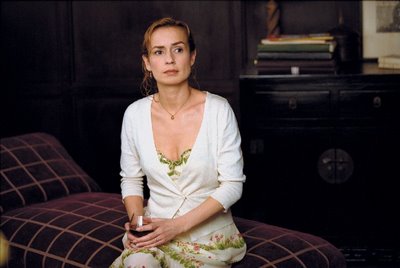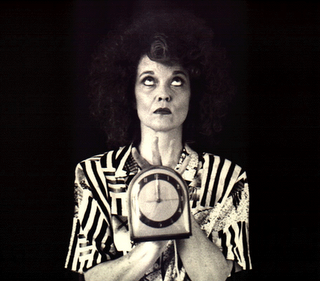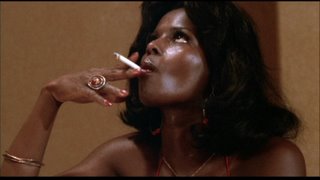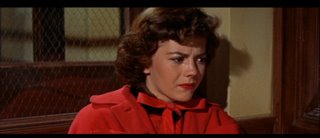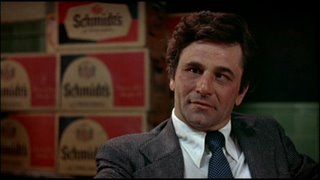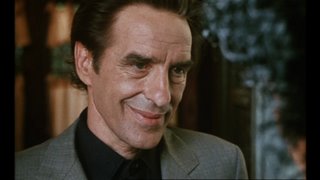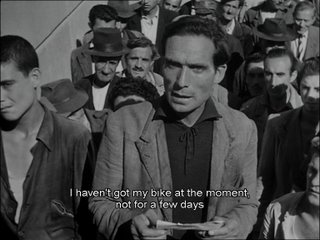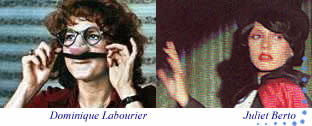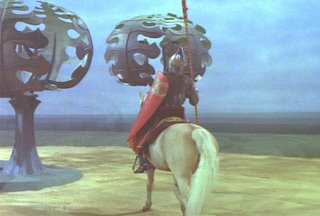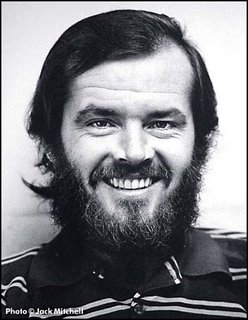
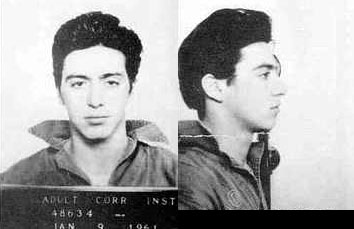
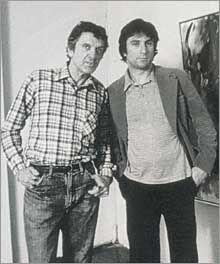
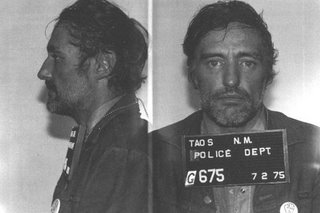
I've been thinking about what happens when actors get too famous for their own good, and it hit me again after watching Jack Nicholson ham it up in "The Departed" on Saturday. It's easy to forget how great some iconic actors were and occasionally still can be when they spend most of their later career either slumming it, chasing after paychecks, or getting lost in their own persona. I'm going to single out four actors in particular who've consistenly excited and disappointed me, for different reasons.
1) Jack Nicholson. At his best, a charismatic, empathetic, and intensely exciting actor, also capable of subtlety and a give-and-take with his costars. At his worst, an eyebrow-wiggling ballhog who forces his own public image on his character.
Jack Nicholson performances I like:
Flight to Fury (Monte Hellman, 1964)
Back Door to Hell (Monte Hellman, 1964)
Ride in the Whirlwind (Monte Hellman, 1965)
The Shooting (Monte Hellman, 1967)
Psych-Out (Richard Rush, 1968)
Easy Rider (Dennis Hopper, 1969)
Five Easy Pieces (Bob Rafelson, 1970)
Carnal Knowledge (Mike Nichols, 1971)
The King of Marvin Gardens (Bob Rafelson, 1972)
The Last Detail (Hal Ashby, 1973)
Chinatown (Roman Polanski, 1974)
The Passenger (Michelangelo Antonioni, 1975)
The Shining (Stanley Kubrick, 1980)
Reds (Warren Beatty, 1981)
Terms of Endearment (James L. Brooks, 1983)
Broadcast News (James L. Brooks, 1987)
Mars Attacks! (Tim Burton, 1996)
The Pledge (Sean Penn, 2001)
About Schmidt (Alexander Payne, 2002)
2) Robert De Niro. Everybody knows what's happened here. Greatness becoming laziness. A series of forgettable Hollywood paychecks.
Recommended, though these are mostly pretty obvious:
Mean Streets (Martin Scorsese, 1973)
The Godfather Part II (Francis Ford Coppola, 1974)
Taxi Driver (Martin Scorsese, 1976)
New York, New York (Martin Scorsese, 1977)
The Deer Hunter (Michael Cimino, 1978) (a problematic movie, but I like the acting in it)
Raging Bull (Martin Scorsese, 1980)
The King of Comedy (Martin Scorsese, 1983)
Once Upon a Time in America (Sergio Leone, 1984)
Brazil (Terry Gilliam, 1985)
Midnight Run (Martin Brest, 1988)
Goodfellas (Martin Scorsese, 1990)
Cape Fear (Martin Scorsese, 1991)
Mad Dog and Glory (John McNaughton, 1993)
Casino (Martin Scorsese, 1995)
Jackie Brown (Quentin Tarantino, 1997)
3) Al Pacino. He used to be subtly wonderful, now he just yells and hams it up. HOO-AHH! She got a GREAT ASS! SHAKESPEARE! Unlike De Niro, he still looks like he's having a good time, though, so he makes me less sad.
Recommended:
The Godfather (Francis Ford Coppola, 1972)
Scarecrow (Jerry Schatzberg, 1972)
Serpico (Sidney Lumet, 1973)
The Godfather Part II (Francis Ford Coppola, 1974)
Dog Day Afternoon (Sidney Lumet, 1974)
Cruising (William Friedkin, 1980)
Scarface (Brian De Palma, 1983) (although I blame this role for the direction of his career)
Carlito's Way (Brian De Palma, 1993)
Donnie Brasco (Mike Newell, 1997)
4) Dennis Hopper. He was always hit and miss. Capable of two amazing performances and three horrific ones in the same year (especially when he does his "hey, man" schtick), he's mostly been slumming in straight-to-video dogshit for the past ten years. He's mostly interested in photography now, which is understandable given the current state of Hollywood filmmaking, but he also loves George W. Bush. Ugh.
Recommended:
Johnny Guitar (Nicholas Ray, 1954)
Rebel Without a Cause (Nicholas Ray, 1955)
Cool Hand Luke (Stuart Rosenberg, 1967)
Easy Rider (Dennis Hopper, 1969)
True Grit (Henry Hathaway, 1969)
The Last Movie (Dennis Hopper, 1971)
Out of the Blue (Dennis Hopper, 1980)
Human Highway (Neil Young & Dean Stockwell, 1982)
Rumble Fish (Francis Ford Coppola, 1983)
River's Edge (Tim Hunter, 1986)
Blue Velvet (David Lynch, 1986)
Hoosiers (David Anspaugh, 1986)
Straight to Hell (Alex Cox, 1987)
The Indian Runner (Sean Penn, 1991)
Red Rock West (John Dahl, 1992)
True Romance (Tony Scott, 1993)
Jesus' Son (Alison Maclean, 1999)
Land of the Dead (George A. Romero, 2005)


